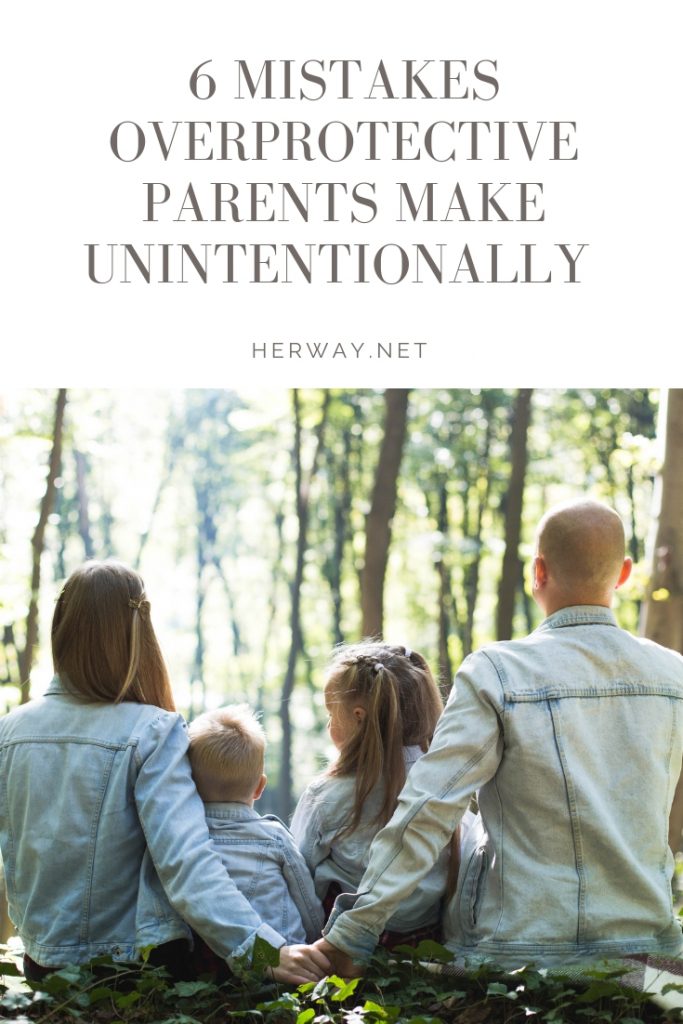I know you want the best for your child and you want to protect them (which is absolutely understandable) but sometimes protection turns into a completely different form of being overly protective, which may greatly influence your child’s development. You cannot be aware of the transition from protection to overprotection because your parental instincts are telling you that you’re still doing the best you can for your child to feel safe and sound.
And that is when you cross the protection border and start blocking your child’s full potential.
The thing is, children need protection but they also need freedom. If you’re constantly telling your child what to do or how to behave, or if you’re doing things for them, you are neglecting their needs for expression, dreams, improvement and boldness.
A child cannot express themselves if they have a strict list of the things they are allowed to do. A child cannot dream if you are interfering with their reality. A child cannot improve and become bold if they are not allowed to fail.
A child needs protection but above all they need freedom.
If you put a bird in a cage, it will feel imprisoned and deprived of its freedom to explore and fly the most dangerous routes. But if you teach that bird how to take care of itself and let it fly away instead of putting it in a cage, it will be protected.
And that is the difference between protection and overprotection. Protection means teaching your child and letting them learn from their mistakes, whereas overprotection means giving specific orders and not letting them fall in order to rise again. If you’re only focused on the things that might hurt your child, you’re creating an unhealthy environment that will greatly affect their development.
If you only see potential danger but do not see the danger of being precautious, it means you’re unintentionally depriving your child of the harsh reality of the real world.
Keeping your child in a bubble, away from consequences, risks and failures, will only make them incapable of dealing with the issues they might be facing in the future.
That is why it is important to protect and not to overprotect your child. Overprotection bears enormous consequences and once you interfere with your child’s abilities and wishes, it is hard to redirect them onto the right path.
6 MISTAKES OVERPROTECTIVE PARENTS MAKE UNINTENTIONALLY
1. They don’t let their child choose for themselves
It doesn’t matter whether it is about choosing a new T-shirt, a hobby or activity because every single decision plays an enormous role in your child’s life. You should not tell they that they have to wear only that T-shirt because it suits them, without asking them whether they want to wear it or not.
The same goes with choosing sports or instruments that they are not that good at and perhaps never will be.
Even if you are aware of the fact that your child is an anti-talent at something, you don’t need to panic and tell them that they should instead try something else that they are good at. No. Even if they are not that good at something, they will realize it themselves over time. The most important thing is to let them realize it the hard way instead of not letting them to even try, which overprotective parents forget doing most of the time.
2. They do everything for their child
When you’re overprotective, you have that constant urge to do things for your child, like making their bed, tidying up their room, even doing their homework. I know you want the best for your child and I know you’ll do it ten times faster and better than your child but please don’t do it.
Children need to be taught responsibility in order to function properly and grow into a conscientious adult.
If you’re constantly doing their tasks, you’re deliberately not giving them space for improvement and you’re not letting them acquire a sense of obligation or responsibility. Instead, you should let your child do their own tasks and if they are not good enough at it, you can help them by showing them how to do it more efficiently and encourage them to try doing it again. That way your child will learn that it takes time and effort for something to be achieved.
3. They are in constant fear of their child’s failure
If you’re in constant fear that your child is not going to achieve something or that they will be disappointed if they don’t achieve something they really want, you’re sabotaging their potential success. There’s a beautiful saying: If you never try, you’ll never know. And it’s true—if you never try achieving something, you’ll never know the true size of your potential.
Being in constant fear forces you to do things you normally wouldn’t do and that is when you cross the border and start being overprotective. It is normal to be worried about your child’s success but it is not normal to prevent them from doing something only because you are afraid that they will fail.
Also, it is normal to be worried about your child’s health, whereabouts and happiness but it is not normal to do everything in your power to prevent them from catching a cold or failing an exam in school. Prevention includes measures and restrictions and if you overdo it, you will find yourself in the realm of being overly protective.
4. They pick their child’s friends
A child’s friends is one of the most important aspects of a child’s development. I understand the pressure you’re going through when your child wants to be friends with someone you don’t like. And then to prevent this, you decide to choose with whom your child is going to hang out because, once again, you want the best for your child.
You want the best teachers, friends, grades and so on. But what does your child want? Do they want to hang out with the friends you’ve chosen for them? Are they enjoying time spent with them?
You have to offer your child choices. If they want to hang out with someone who accidentally happens to have bad grades at school, this doesn’t mean that your child is going to follow in their footsteps.
On the contrary, your child needs to be exposed to different types of personalities (not only the types you’ve approved) because life is all about diversity. They will never be able to fully grow up if you are not letting them surround themselves with different personalities and not only those who will inspire them. You should let them learn from other people’s behavior instead of teaching them to judge others because acceptance is what makes us human.
5. They demand constant reassurance about their child’s whereabouts
I know the world is not the safest place to be but this is not a reason to demand constant reassurance about your child’s whereabouts. It is okay to demand of them to tell you when they are going to visit friends or going to the movies or similar. And it is okay to tell them that they have to come home before twelve. But it is not okay to call them every twenty minutes in order to check whether everything’s okay with them.
It is not okay because you’ve already told them when they have to come home and if they are in danger or need something from you, I’m sure they would have called you. It is really stressful to go through such situations when your child is supposed to be having a good time with their friends.
If you’re constantly calling or texting them, you’re not giving them any space and time for themselves.
It is of crucial importance to be able to trust your child. When you’re doing everything for your child and not letting them participate, it is expected that you’ll be excessively worried when the child leaves the house. You have to teach them responsibility and you have to teach yourself to trust them.
6. They don’t let their child digest their own emotions
We all know that when we were babies, our parents would jump and run to us if they only heard us crying. Once you’re there, you take the baby in your arms and start comforting them. And that is perfectly okay because crying is a baby’s way of talking to you and you can never know what the cry is about.
But if you keep overly consoling your child (no matter their age), you are not letting them mature emotionally. There is no need to excessively console your child over the most trivial things because that way they will remain weak. They will not know how to deal with their own emotions and desires, which may have big consequences on their adulthood.
When something bad happens, it is okay to listen to your child but try to prevent yourself from identifying them as a weak, little puppet who needs your comfort. You can comfort them a little bit but you should also always give them space to digest their own feelings and emotions.
They need to understand why they feel the way they feel at that moment and how to control their feelings because that is what will help them become emotionally mature.


